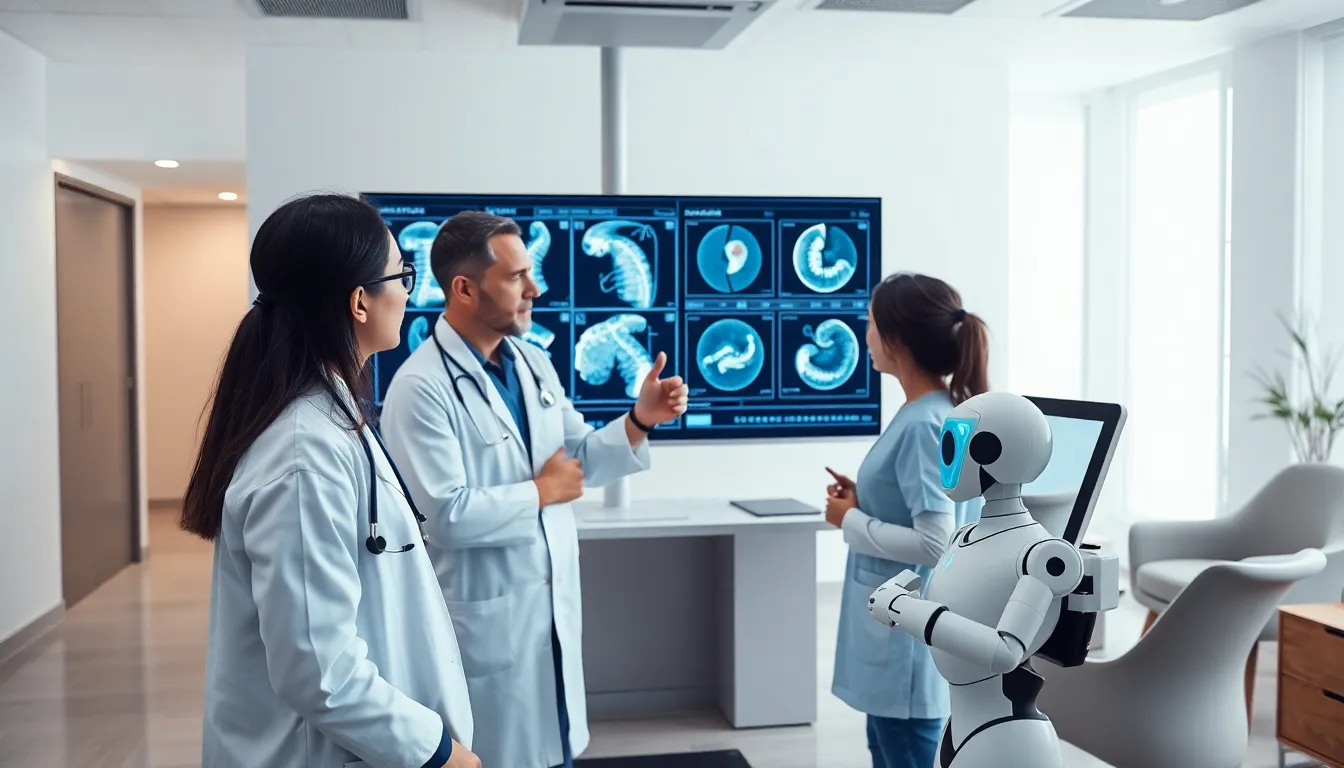Artificial intelligence is not just about robots taking over the world: it’s also about improving our healthcare systems, making them smarter and more efficient. Imagine having a virtual assistant that helps doctors diagnose illnesses faster than they can say, “Uh-oh, that doesn’t look good.” But let’s pump the brakes a little. As wonderful as AI can be, it’s not all rainbows and unicorns. So, buckle up, as we explore the thrilling yet intricate landscape of artificial intelligence in healthcare, weighing its perks against its pitfalls.
Table of Contents
ToggleOverview of AI in Healthcare

Artificial intelligence in healthcare refers to the application of algorithms and software to mimic human cognition in analyzing complex medical data. Picture smart diagnostic tools that can comb through thousands of medical images in seconds, spotting anomalies that may evade the seasoned eye of a radiologist. From predictive analytics that pinpoint potential health risks to chatbots offering 24/7 patient support, AI is set to revolutionize how healthcare professionals provide care. Even though its promise, AI brings its own set of challenges, making the conversation around it a crucial one.
Benefits of Artificial Intelligence in Healthcare
AI isn’t just a trend: it’s reshaping healthcare in monumental ways. Here are some of the standout benefits:
Enhanced Diagnostic Accuracy
Imagine a world where a simple algorithm can analyze your symptoms and medical history to suggest a diagnosis before you even step into the doctor’s office. Technologies powered by AI are showing remarkable promise in reducing diagnostic errors. For instance, AI systems can analyze imaging data with an accuracy that sometimes surpasses that of human practitioners.
Increased Efficiency and Workflow Optimization
Time is of the essence in healthcare. AI can streamline administrative tasks, allowing healthcare providers to focus more on patient care. This means fewer delays in treatment and quicker appointments, significantly enhancing the overall patient experience.
Personalized Medicine and Treatment Plans
Gone are the days when a one-size-fits-all approach ruled the medical field. With AI’s ability to analyze vast amounts of data, healthcare providers can now tailor treatment plans specific to an individual’s genetic makeup and lifestyle choices. This shift is monumental in achieving better health outcomes.
Cost Reduction
Implementing AI can lead to significant cost savings in healthcare. By reducing unnecessary tests, improving accuracy in diagnosis, and streamlining operations, AI has the potential to lower treatment costs. In an industry where expenses often spiral out of control, this advantage is noteworthy.
Challenges and Drawbacks of AI in Healthcare
Even though its shiny benefits, using AI in healthcare comes with a set of challenges that cannot be ignored. Here are the key drawbacks:
Data Privacy and Security Concerns
With great power comes great responsibility, and a whole lot of sensitive data. The implementation of AI in healthcare raises pressing concerns about patient data privacy and security. If this information lands in the wrong hands, it could lead to devastating consequences.
Bias and Ethical Considerations
AI systems learn from data, which means they can inherit biases present in the training data. This can result in unequal treatment where certain demographic groups may receive less attention or inaccuracies in diagnosis.
Reliability and Accountability Issues
Who owns the responsibility when an AI misdiagnoses a patient? Determining accountability can be murky. As healthcare becomes increasingly reliant on algorithms, establishing clear lines of responsibility becomes critical.
Impact on Healthcare Jobs
The rise of AI could lead to job displacement in the healthcare sector. While many tasks will be enhanced or automated, this shift could leave some professionals grappling with the repercussions.
Future Perspectives on AI in Healthcare
As we step into the future, the integration of AI in healthcare seems inevitable. Here are a couple of perspectives worth considering:
Integrating AI with Human Expertise
The future isn’t about AI replacing healthcare professionals: it’s about AI augmenting their skills. Combining AI capabilities with human intuition could lead to far better patient outcomes. Having a doctor backed by solid AI insight, for instance, makes for a powerful team.
Regulatory and Ethical Frameworks
As AI advancements continue to evolve, implementing robust regulatory frameworks is essential. By establishing ethical guidelines, stakeholders can ensure that AI innovations prioritize patient safety and equitable healthcare delivery.



